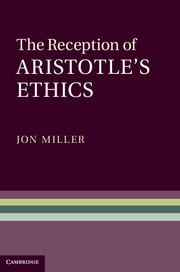Book contents
- The Reception of Aristotle's Ethics
- Contents
- Notes on contributors
- Acknowledgments
- A note on abbreviations and transliteration
- Introduction
- Chapter 1 The Nicomachean Ethics in Hellenistic philosophy
- Chapter 2 The transformation of Aristotle's ethics in Roman philosophy
- Chapter 3 Aristotelian ethics in Plotinus
- Chapter 4 St. Augustine's appropriation and transformation of Aristotelian eudaimonia
- Chapter 5 The Arabic and Islamic reception of the Nicomachean Ethics
- Chapter 6 Maimonides’ appropriation of Aristotle's ethics
- Chapter 7 The relation of prudence and synderesis to happiness in the medieval commentaries on Aristotle's ethics
- Chapter 8 Using Seneca to read Aristotle
- Chapter 9 Aristotle's Ethics in the Renaissance
- Chapter 10 The end of ends? Aristotelian themes in early modern ethics
- Chapter 11 Affective conflict and virtue
- Chapter 12 Kant and Aristotle on ethics
- Chapter 13 The fall and rise of Aristotelian ethics in Anglo-American moral philosophy
- Bibliography
- Index
Chapter 2 - The transformation of Aristotle's ethics in Roman philosophy
Published online by Cambridge University Press: 05 February 2013
- The Reception of Aristotle's Ethics
- Contents
- Notes on contributors
- Acknowledgments
- A note on abbreviations and transliteration
- Introduction
- Chapter 1 The Nicomachean Ethics in Hellenistic philosophy
- Chapter 2 The transformation of Aristotle's ethics in Roman philosophy
- Chapter 3 Aristotelian ethics in Plotinus
- Chapter 4 St. Augustine's appropriation and transformation of Aristotelian eudaimonia
- Chapter 5 The Arabic and Islamic reception of the Nicomachean Ethics
- Chapter 6 Maimonides’ appropriation of Aristotle's ethics
- Chapter 7 The relation of prudence and synderesis to happiness in the medieval commentaries on Aristotle's ethics
- Chapter 8 Using Seneca to read Aristotle
- Chapter 9 Aristotle's Ethics in the Renaissance
- Chapter 10 The end of ends? Aristotelian themes in early modern ethics
- Chapter 11 Affective conflict and virtue
- Chapter 12 Kant and Aristotle on ethics
- Chapter 13 The fall and rise of Aristotelian ethics in Anglo-American moral philosophy
- Bibliography
- Index
Summary
Overview
What did Roman philosophy make of Aristotle's ethical writings and teachings? More precisely, what role did Aristotle's ethics play in the most active period of Classical Roman philosophical culture, the first centuries bc and ad? This is the core question tackled in this chapter. However, to give any sensible answer to this question, it needs to be put in perspective. What we call “Roman philosophy” is, in large measure, the Roman reception of Greek philosophy, especially that of the preceding Hellenistic period. During this period, philosophical inquiry and debate was taken forward not only by Roman aristocrats such as Cicero and Seneca, but also by Greek teachers and writers who were often dependent on Roman political and economic patronage. Greek thinkers, both before and during this period, played a crucial part in setting the intellectual agenda that shaped the way Romans understood philosophy in this period. Hence, the topic for this chapter is better conceived as the reception of Aristotle's ethics in Greco-Roman intellectual life of the late Roman Republic and early Empire.
What period, precisely, is being covered in this chapter? The Hellenistic age is conventionally regarded as ending in 31 bc, a date defined in political terms, the battle of Actium, which established the start of Augustus’ rule of the Roman Empire. But scholars now tend to see the period 100 bc–ad 200 as forming a relatively determinate era, sometimes called the ‘post-Hellenistic’ period. This period forms a transition between the emergence of the main Hellenistic movements (Stoicism, Epicureanism, Academic Skepticism) in the third and second centuries bc and the four centuries (ad 200–600) dominated by the commentators on Plato and Aristotle. Two salient events falling within this period were Sulla's sack of Athens in 87 bc and the establishment of four chairs for the leading schools of philosophy (Aristotelianism, Platonism, Stoicism, Epicureanism) by Marcus Aurelius at Athens in ad 176. The first event brought about the closure of the philosophical schools (as formal institutions) at Athens and the movement of many intellectuals and writings to Rome.
- Type
- Chapter
- Information
- The Reception of Aristotle's Ethics , pp. 31 - 52Publisher: Cambridge University PressPrint publication year: 2012
- 18
- Cited by

